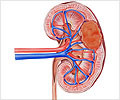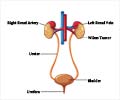- Novel combination of angiogenesis (new blood vessel formation) inhibitor axitinib and immunotherapy agent pembrolizumab shown to be very effective, yet tolerable with fewer adverse effects in the treatment of advanced kidney cancer
- Advanced renal carcinoma is hard to cure, and several clinical trials testing new treatment options are ongoing
Combination Therapy For Advanced Kidney Cancer – Previous Vs. Current Trials
- Previous attempts at trialling combinations of angiogenesis inhibitor and immunotherapy agent resulted in significant level of toxicities causing the studies to be dropped.
- In contrast, the current combination of angiogenesis inhibitor axitinib and immunotherapy agent pembrolizumab was tolerated quite well enabling them to be administered at FDA-approved single-agent dose levels.
Details Of The Study
The team began their phase I clinical trial of this combination in 2014 and enlisted 52 cases of advanced renal cell carcinoma (the most common form of kidney cancer) patients who had not previously been treated for the same.- The team set out to establish the dose that could be effective yet safely tolerated in a subset of 11 patients, during the first six weeks of the trial before testing on all 52 participants
- All the patients then were given an intravenous infusion of pembrolizumab initially and then every three weeks thereafter
- Simultaneously the patients also took Axitinib twice a day until they could no longer withstand the treatment or no further improvement was noted during assessments
- The study team looked at tumor size at start of trial enrolment, comparing it to 12 weeks later and for every six weeks following this
Key Findings of the Study
- In the 11-patient subgroup, three of the patients were unable to tolerate axitinib and were therefore given less than 75 percent of the planned dose to minimize side effects
- The remaining eight patients experienced tolerable side effects, thus establishing this dose level and the recommended dose level to be followed for further investigation in the additional group of 41 patients
- Significantly, patients demonstrated lesser liver toxicity and tiredness than patients treated with similar combination treatments previously, Atkins said
- With this new combination therapy, shrinkage of tumor size or stabilization was better than what was observed when patients received either of the drugs alone
- Seventy-three percent of patients showed significant tumor shrinkage following the combination therapy
- Median time interval in which there was no disease progression (i.e., disease was in remission) was 20.3 months
- Overall survival results are still not available as 88 percent of the patients are now still alive at minimum 18 months after initiation of combination therapy
- In March 2017, 25 patients were still undergoing treatment in the trial, with 22 getting the drug combination and three given pembrolizumab only
According to Atkins, "We think this combination could present a major advance in the treatment of this disease, as well as help define effective combinations of similar drugs for other cancers."
A separate randomized phase III trial comparing the current combination (axitinib plus pembrolizumab) to the FDA-approved anti-angiogenesis agent sunitinib is ongoing, and there are plans to test whether the current drug combination is better than the previous regimens followed for advanced renal cancer treatment.
In Brief About Angiogenesis Inhibitors and Immunotherapy Agents
Cancer cells stimulate new blood vessel (angiogenesis) formation which then supplies nutrients and oxygen to the tumor cells enabling them to grow and spread. Angiogenesis inhibitors prevent new blood vessel formation, thereby cutting off oxygen and nutrient source for the tumor and causing the tumor to shrink.Pembrolizumab, an immunotherapy agent blocks the mechanism whereby cancer cells avoid being attacked and destroyed by the host immune system. Thus immunotherapy agents, improve the effectiveness of the immune system. Pembrolizumab is FDA-approved for the treatment of several cancer types such as head and neck cancer, melanoma, lung, and bladder but there is limited research done in patients with kidney cancer.
References:
- Treatment Choices by Stage for Kidney Cance - (https://www.cancer.org/cancer/kidney-cancer/treating/by-stage.html)
- Angiogenesis inhibitor - (https://en.wikipedia.org/wiki/Angiogenesis_inhibitor)
















